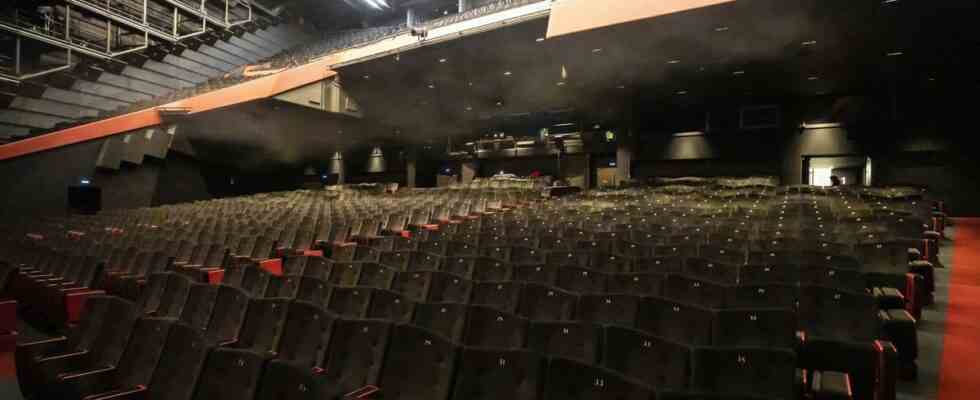A stage, a microphone: the basis of stand-up is to succeed in making a sometimes recalcitrant public laugh, in a large room or in the depths of a cellar in the 11th arrondissement. If in the past, comedians relied on flyers distributed at the exit of theaters and word of mouth to promote themselves, now they go through social networks. If you’ve ever attended a stand-up set, you know how highly competitive the comedy industry is, between bident jokes and hat pay. The digital is then decisive for many comedians.
“I think it’s almost mandatory. I don’t see how you can make yourself known otherwise: it’s a showcase and it brings legitimacy, ”explains Nina Azoulai, winner of the TikTok Comedy Club competition, organized by the short video platform. Like her, many talents from the new French scene have revealed themselves via social networks: Inès Reg, Lison Daniel, Laura Felpin… From short videos on Instagram or TikTok to the stage, there is only one step.
The turning point of containment
The confinement of 2020 has shaken up the practice of humor: locked up at home, comedians, professionals or aspirants, have used their smartphones to start or continue to make jokes. This is the case of Tahnee, who started using social networks in 2019, from her regular programming at the Comédie des 3 Bornes, a Parisian room. “To fill the room, I started to make small videos, I had fun doing film parodies where I did the dubbing myself”. But the comedian explains that she “really got into it” during confinement. “I needed to maintain a rapport with the public and make jokes. It reconciled me with the practice of social networks,” she adds.
For Nina Azoulai, confinement was an opportunity to get started. “I did 2 scenes, and then we were confined! I already wanted to get started on the networks, on the model of Camille Lellouche, and the confinement pushed me. In May 2020, I started on TikTok, to try to catch the wave ”explains the comedian. From the start of the 2021 school year, she juggles between videos on Instagram and TikTok and the stage. “I didn’t let go, it could have broken through more, but I’m still happy. For 2/3 months, I have intensified my content to enter the algorithm” adds Nina Azoulai, who now publishes 4 to 5 videos per week. A real second job in addition to stand-up.
Comedians facing algorithms
However, it is not enough to put yourself on Instagram to gain hundreds of subscribers in the snap of your fingers. For comedians, gaining notoriety on the networks is a job in its own right. “I put scene extracts but not too much because you don’t want spoilers, a little more improvisation because these are unseen moments… If I have an idea about the news, I do it on video, and if it takes a bit, I reinforce the thing on stage” describes Nina Azoulai. For Tahnee, “it’s maintaining an activity and a link with subscribers, with the aim of bringing them to the show. But I’m not sure I’ll do it as much the day I don’t have a show anymore, because it takes time and it’s free content. Because writing, shooting and editing videos takes almost as much time as writing good jokes.
Especially since faced with the algorithms of Instagram and TikTok, comedians have little room for maneuver. “I have the impression that what works is different depending on the platforms. But you have to be very regular,” assures Tahnee. And from one video to another, the flop can be felt on the number of likes. “We are a little disgusted when it does not take. We can understand the videos that succeed, as a somewhat original subject, on other videos it’s a bit of a disappointment, but we must continue to post no matter what,” reacts Nina Azoulai. Faced with algorithms, some algorithms can feel a kind of Stockholm syndrome: post at all costs, in the hope of filling the rooms.
Can we succeed without posting?
Especially since an increased presence on social networks exposes comedians to bad buzz or cyberbullying. “As I address topics in my show that revolve around my mixed race, I denounce racist experiences, I talk about my coming out… My show is openly lesbian, so I was a little afraid of cyberbullying and trolls going on some platforms. When you’re in front of the comedian, it’s not the same relationship ”says Tahnee. A fear of cyberbullying that can be heightened for women, racialized people and LGBTQ +, the humor world is not exempt from it. Plus, spending time creating content online doesn’t always equate to more people in the audience.
To post or not to post, that is the question… Which however seems quickly answered, according to the comedians questioned. Nina Azoulai considers that the presence on social networks is “almost mandatory”. “Most comedians say that people move and fill rooms when you promote your show through your networks. And once you have the show, it feeds your content,” explains the young comedian. For Tahnee, being active online has “become indispensable”, but it is not enough. “You also have to have a solid show, because we program you based on your show,” she adds, who plays her show every Wednesday at the Nouvelle Seine. Because likes don’t always translate into laughter in the audience.

